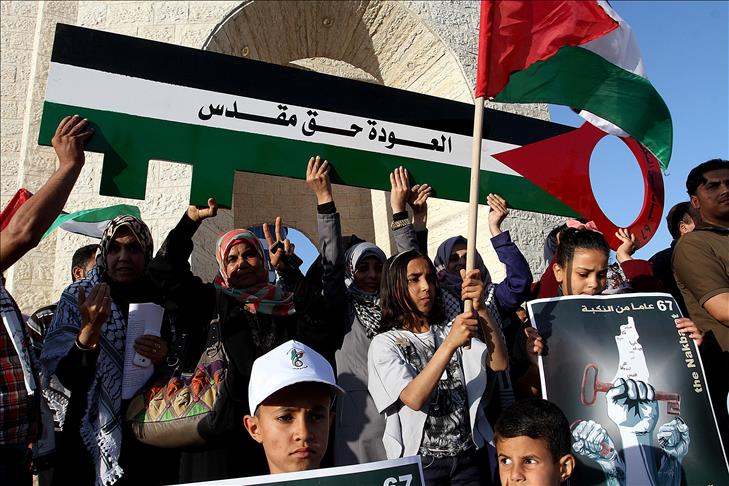
CAIRO
On the 67th anniversary of the Nakba, observers argue that ongoing political upheaval in several Arab countries has largely shifted the focus away from the Arab-Israeli conflict, pushing the plight of the Palestinians further off the agenda of most Arab governments.
"The Palestinian cause has become much less of a priority on both the international and Arab levels," Tarek Fahmi, political science professor at the American University in Cairo and an expert on Israeli affairs, told Anadolu Agency.
Palestinians mark the Nakba (Arabic for "catastrophe") on May 15 of every year – the date on which the state of Israel was established in 1948 on the land of historical Palestine.
"Nakba Day" – celebrated in Israel as "Independence Day" – commemorates the events that led to the destruction of most of Palestine's political, economic and cultural heritage to make way for the creation of the self-proclaimed Jewish state.
To Palestinians – and Arabs in general – the Nakba encompasses an array of events, from the occupation of most Palestinian land by what Palestinians describe as armed Zionist groups and the displacement of some 957,000 Palestinians, to land confiscations that go on to this day.
The Nakba also applies to dozens of mass killings perpetrated by Zionist groups against Palestinians, in which hundreds of Palestinian men, women and children were killed.
The right to return to their homes in historical Palestine remains a key demand for many Palestinians.
Four years ago, protesters – during the 2011 "Arab Spring" uprisings – called for the liberation of Palestine in defiance of their respective governments.
The Nakba's 67th anniversary, however, comes as most "Arab Spring" states remain embroiled in deadly political infighting and derailed democratic transition.
"Arab regimes are preoccupied with the tumultuous ramifications of post-revolution transition phases, which has taken the focus off the Palestinian file," Fahmi said.
He pointed to ongoing violent conflicts in Syria, Yemen, Iraq and Libya, as well as Egypt's compromised political transition.
Talal al-Atrissi, director of the Lebanon-based Center for Strategic Studies, argues that fears of the possible disintegration of Syria, Iraq and Yemen have largely taken the attention of Arab leaders and public opinion, throwing memories of the Nakba further into the periphery of Arab decision-making.
"Priority had earlier been given to negotiations related to resolving the Arab-Israeli struggle. But currently, the focus has shifted to issues like combatting extremist groups and averting fresh popular revolts," al-Atrissi said.
"Arab leaders who are now concerned with the unfolding crisis in Yemen will not convene on the occasion of Nakba Day to discuss the Palestinian cause," he said.
He was referring to the ongoing conflict between Yemen's Houthis and Gulf States that are waging a weeks-long military campaign against the Shiite group.
"These circumstances are reflected in media coverage related to the Nakba and in collective decisions made by the Arab League," he added.
Eclipsed by current conflict
Mohamed Khasrouf, a Yemeni security expert, argued that the level of violence reached in current conflicts in the Arab world had served to eclipse memories of Israel's Nakba-era atrocities – not to mention continued Israeli practices against Palestinians in the occupied West Bank and the blockaded Gaza Strip.
"No one could have imagined that the post-Arab Spring situation would reach this level of bloodshed," Khasrouf, who is also a retired army general, said.
"In Yemen, airstrikes and street battles involving Al-Qaeda militants have become the norm," he added.
"The same goes for Iraqis, who have become used to recurrent suicide bombings in street markets; and for Syrians, who are being hit with barrel bombs in their own neighborhoods," he asserted.
Fahmi, for his part, the Israeli affairs expert, believes western powers, too, have largely abandoned any serious interest in reviving Palestinian-Israeli peace talks.
U.S.-brokered peace talks between Palestinian and Israeli negotiators ground to a halt in early 2014 after Israel failed to honor an earlier pledge to release a group of Palestinian detainees.
"There are no signs that the U.S. – or the wider international community – regards peace talks as a priority," Fahmi contended.
"The UN Security Council is preoccupied with discussing current violent conflicts across the Arab world and containing Iran's nuclear program," he said.
Fahmi added: "These signals have not changed, even after Israeli Prime Minister Benjamin Netanyahu bluntly announced that he would never allow the establishment of a Palestinian state during his tenure."
For his part, Sameh Shahib, a professor at the West Bank's Birzeit University, argued that the Palestinian cause could not be ignored for long.
"Palestinian plight has outlasted many upheavals in the Arab world… like the current attempt by the Houthis to take over Yemen or Daesh militants doing the same in Syria and Iraq," Shahib said.
"But the Palestinian cause," he added, "is too important to be cast aside."
Anadolu Agency website contains only a portion of the news stories offered to subscribers in the AA News Broadcasting System (HAS), and in summarized form. Please contact us for subscription options.







